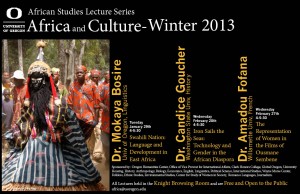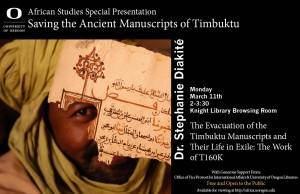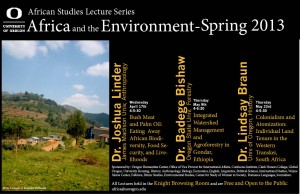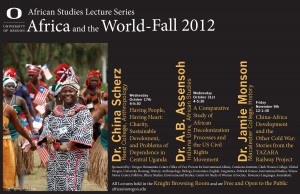News & Events
African Studies Lecture Series 2015-2016
Fall quarter: Performative Culture
Wednesday, October 14. 12-1.15 pm, Knight Library Browsing Room – Dr. Susan Gagliardi. Art History, Emory University
“Unseeing Audiences: Women and Power Associations on the Senofo-Mande Cultural ‘Frontier’ ”
Thursday, October 29. 12-1.15 pm, Knight Library Browsing Room – Patience Munjeri. Kutsinhera Cultural Arts Center/Zimbabwe
“Traditional Zimbabwean Mbira Music and Its Uses in Spiritual and Cultural Contexts”
- Watch the video of Patience’s talk here: http://media.uoregon.edu/channel/archives/10250
Thursday, November 12. 12-1.15 pm, Knight Library Browsing Room – Dr. Habib Iddrissu. Ethnomusicology & Dance, University of Oregon
“Creation of the Multi-Ethnic Master Drummer”
Spring quarter: Sexuality in Africa
Monday, April 11. 12-1.15 pm, Knight Library, Browsing Room– Dr. Angela Montague. International Studies, University of Oregon
“Rites vs. Rights: Female Genital Cutting in Sub-Saharan Africa”
- Watch the video of Dr. Montague’s talk here: http://media.uoregon.edu/channel/archives/10753
Tuesday, May 3. 12-1.15 pm, Knight Library, Browsing Room – Dr. Rachel Jean-Baptiste. Department of History, University of California-Davis
“The Ancient and The Modern: Customary and Civil Marriage and Family Law in Post-Colonial Gabon”
- This talk addresses the complex issues surrounding competing systems of what counts as sanctioned marriage in current-day Gabon. Dr. Jean-Baptiste is a historian of colonial and post-colonial French-speaking Central and West Africa, with research interests in the history of sexuality, gender, and women’s history, marriage and family law, among other topics.
- Watch the video of Dr. Jean-Baptiste’s talk here: http://media.uoregon.edu/channel/archives/10853
Thursday, May 12. 12-1.15 pm, Knight Library, Studio A – Dr. Sanyu Mojola. Department of Sociology, University of Colorado-Boulder
“Love, Money, and HIV: Becoming a Modern African Woman in the Age of AIDS”
African Studies Lecture Series 2013-14
Fall Quarter: Africa/Food
Friday, October 25, 2013. 2-4 pm, Many Nations Longhouse – Dr. Judith Carney, Department of Geography, UCLA and Mr. Michael Twitty, Independent Culinary Scholar
“Afroculinaria: Exploring the Foodways Legacy of Trans-Atlantic Slavery”
- Exploring the Foodways Legacy of Trans-Atlantic Slavery”, will be a dynamic dialogue between two amazing people. We are excited to host Judith Carney (UCLA) and Michael Twitty (Antebellum Chef and Kosher/Soul) – each with rich experiences and perspectives – as our conversation participants. The discussion will be moderated by Riki Saltzman of the Oregon Folklife Network.For more information on the speakers please visit:
Judith Carney, http://www.geog.ucla.edu/people/faculty.php?lid=594&display_one=1&modify=1
Michael Twitty, http://afroculinaria.com
- Watch the video of Carney and Twitty talk here: http://media.uoregon.edu/channel/2013/11/06/afroculinaria-exploring-the-foodways-legacy-of-trans-atlantic-slavery/
Wednesday, October 30, 2013. 12-1.15pm – Dr. Daphne Gallagher, Department of Anthropology, UO
“Shea butter and land management in precolonial Burkina Faso (100-1600 CE)”
- Dr. Gallagher joined the UO Department of Anthropology in 2010 as a lecturer, courtesy research associate and undergraduate adviser. During this time she initiated the African Studies Lecture Series as co- organizer. Dr. Gallagher received her MA and Ph.D. in Anthropology from University of Michigan, Ann Arbor and has conducted research in Burkina Faso, Mali, Kenya and Tunisia. Her research interests include cultural context of agricultural practice, human ecology of savanna environments, and vegetal salt industries of West Africa.
Wednesday, November 13, 2013. 12-1.15pm – Dr. Larry Becker, Department of Geography, Oregon State University
“Land Sales on the Urban Fringe in Mali: Food and Equity in Jeopardy?”
- Dr. Becker is a professor of Geography and the Director of Environmental Sciences Undergraduate Program at Oregon State University. His specialties are agricultural, food systems, and development in Mali and Côte d’Ivoire. He gained extensive experience while completing his post-doc work with West African Rice Development Association (WARDA) in Cote d’Ivoire (now called the Africa Rice Center). He received his M.A. in education from Stanford University and his Ph.D. in Geography from School of Oriental and African Studies (SOAS), University of London. His current research interests include agrarian change and natural resource management.
Winter Quarter: Africa/Democracy
Wednesday, January 22, 2014. 12-1.15pm – Dr. James Long, Department of Political Science, University of Washington
“The Impact of Elections on Kenya’s Path to Democratization”
Wednesday, February 12, 2014. 12-1.15pm – Ambassador Eric Benjaminson, Former Ambassador to Gabon
“A 21st Century African Transition: Gabon as a Case Study of the Unanticipated Frictions of Democratization”
Wednesday, February 26, 2014. 12-1.15pm – Dr. Lisa Gilman, Program in Folklore/Department of English, UO
“Ethnic Pride or Tribalism: The Formation of Ethnic Associations in Multiparty Malawi”
Spring Quarter: Africa/Economies
Thursday, April 3, 2014. 12-1.15pm – Dr. Stelios Michalapolous, Department of Economics, Brown University
“On the Institutional Origins of African Development: National versus Ethnic-Specific Legacies”
Thursday, April 11, 2014. 12-1.15pm – Dr. Isaac Mbiti, Department of Economics, Southern Methodist University
“Mobile Money in Kenya”
Thursday, May 8, 2014. 12-1.15pm – Dr. Melissa Graboyes, African Studies, UO
“Economies of Blood in East Africa: From Witchcraft to Transfusions”
African Studies Lecture Series 2012-2013
Wed, October 17, 2012. 4-5:30 pm – Dr. China Scherz, Anthropology, Reed College
“Having People, Having Heart: Charity, Sustainable Development, and Problems of Dependence in Central Uganda”
- Dr. Scherz is a medical anthropologist interested in development, ethics/morality and humanitarianism. Dr. Scherz received her PhD from UC-Berkeley in 2010, and has carried out research in both Uganda and Ireland.
- Watch the Video of Dr. Scherz’s Talk: http://media.uoregon.edu/channel/2012/10/23/african-studies-lecture-series-dr-china-scherz/
Wed, October 31, 2012. 4-5:30 pm. – Dr. A.B. Assensoh, African American and African Studies, Indiana University
“A Comparative Study of African Decolonization Processes and the US Civil Rights Movement”.
- Dr. Assensoh’s talk provides a comparison of the leadership of the two movements and processes, bringing African American and African political and social histories in contact. As a historian and Professor Emeritus at Indiana University, he has been affiliated with IU’s African American and African Diaspora Department for many years, and has published books across African and Africa-American Studies (Rev. Dr. Martin Luther King, Jr., and America’s Quest for Racial Integration, African Military History and Politics, 1900-Present, and African Political Leadership). He is currently working on a new manuscript about Malcolm X, which will be co-authored with his wife, Dr. Yvette Alex-Assensoh.
- Watch the Video of Dr. Assensoh’s Talk: http://media.uoregon.edu/channel/2012/11/13/a-comparative-study-of-african-decolonization-processes-and-the-us-civil-rights-movement/
Fri, November 9, 2012. 12-1.30 pm.– Dr. Jamie Monson, History, Macalester College
“China-Africa Development and the Other Cold War: Stories from the TAZARA Railway Project”
- Dr. Monson is currently conducting research on China-East Africa relations during the Cold War years. She is Professor of History at Macalester College. Past books have included Africa’s Freedom Railway: How a Chinese Development Project Changed Lives and Livelihoods in Tanzania (Indian University Press) and Women as Food Producers in Developing Countries (Crossroads). She has received funding from the NEH, ACLS, the Carnegie Foundation, Social Science Research Council, the Wissenschaftskolleg zu Berlin (Institute for Advanced Study), and the Fulbright-Hays program. She conducts research in Swahili, German, Spanish, French and Chinese.
Winter Quarter: Africa/Culture
Tue, January 29, 2013. 4-5.30 pm. – Dr. Mokaya Bosire, Linguistics, University of Oregon
“Swahili Nation: language & development in East Africa”
- Dr. Bosire is newly arrived at the UO, has his home in the Department of Linguistics and is responsible for all three years of Swahili instruction on campus. He received his Ph.D. in Anthropology and Linguistics from State University of New York, Albany and has conducted research in Kenya and the United States. His talk addresses what role Swahili plays in the holistic development of East Africa, focusing on the significance of the language for those from the Swahili Nation.
- Watch the video of Dr. Bosire’s talk:http://media.uoregon.edu/channel/2013/01/31/dr-mokaya-bosire-swahili-nation-language-development-in-east-africa/
Wed, February 20, 2013. 4-5.30 pm. – Dr. Candice Goucher, History, Washington State University
“Iron Sails the Seas: Technology and Gender in the African Diaspora”
- Dr. Candice Goucher is Professor of History at Washington State University and has conducted research in West Africa, the Caribbean, Mauritius, and the Northwest. She was trained as a historian and archaeologist, receiving a masters degree in art history & archaeology from Columbia University and a PhD in African History from UCLA. She has been active in writing texts on world history and in the production of films such as “The Blooms of Banjeli: Technology and Gender in West-African Iron-Making,” which won the Society for Visual Anthropology Award of Excellence. She is currently on the Board of Editors for the 9-volume Cambridge History of the World and she is writing a history of Caribbean food. You can read more about Dr. Goucher’s work at http://libarts.wsu.edu/history/faculty-staff/goucher.asp
- Watch the video of Dr. Goucher’s talk: http://media.uoregon.edu/channel/2013/02/22/candice-goucher-iron-sails-the-seas-technology-and-gender-in-the-african-diaspora/
Wed, February 27, 2013. 4-5.30 pm.– Dr. Amadou Fofana, French, Willamette University
“The Representation of Women in the Films of Ousmane Sembene”
- Dr. Fofana is Associate Professor of French at Willamette University. He received a Licence es Lettres and a Maîtrise in English from Cheikh Anta Diop University, Dakar, Senegal. He also received an MA in French Literature and Civilization from Michigan State University, and completed his Ph.D. in African Languages and Literature from University of Wisconsin, Madison. His research and teaching interests include French language and literature, Francophone literature and cultures, African languages, literature and films. He is the author of The Films of Ousmane Sembène: Discourse, Politics and Culture.
- Watch the video of Dr. Fofana’s talk: http://media.uoregon.edu/channel/2013/03/04/dr-amadou-fofana-the-representation-of-women-in-the-films-of-ousmane-sembene/
Special Presentation: Saving the Ancient Manuscripts of Timbuktu
Monday, March 11th, 2013. 2-3.30 pm. – Dr. Stephanie Diakité
“The Evacuation of the Timbuktu Manuscripts and Their Life in Exile: The Work of T160K”
- Dr. Diakité will tell the moving story of the evacuation of the private libraries and the national collection in Mali. She will also share the work she and Abdel Kader Haidara, co-implementor of the evacuation and curator of one of the largest private libraries in Timbuktu, have initiated to safeguard the patrimony in exile and to share its significant governance and conflict resolution content for the purpose of enduring peace in Mali. Dr. Diakité and Abdel Kader Haidara hope to work with people worldwide in research, conservation and governance fields to integrate the significant governance and conflict resolution knowledge in the manuscripts into the peace process in Mali in truly participative ways. They believe that given the opportunity, the manuscripts and the indigenous peace building knowledge they contain can enable Malians to find enduring solutions to the crises they are experiencing both in the north and in the south. Further, they believe that lessons learned from this process can be extended to other areas of persistent conflict in Africa for the purpose of enduring peace.
- Watch the video of Dr. Diakité’s talk: http://media.uoregon.edu/channel/2013/03/13/stephanie-diakite-the-evacuation-of-the-tumbuktu-manuscripts-and-their-life-in-exile-the-work-of-t160k/
Spring Quarter: Africa/Environment
Wed, April 17, 2013. 4-5.30 pm. – Dr. Joshua Linder, Anthropology, James Madison University
“Bushmeat and Palm Oil: Eating Away African Biodiversity, Food Security, and Livelihoods”
- Dr. Joshua Linder is a primatologist in the Department of Sociology and Anthropology at James Madison University. His research examines the consequences of defaunation for plant and animal communities and explores how humans perceive and become motivated to protect their natural environment. His broad research interests include primate ecology and conservation, hunting in the tropics and the bushmeat trade, protected area management, and oil palm and land grabbing. He serves as a Board Member of, and scientific advisor to SAVE Wildlife Conservation Fund on their campaign against the development of an oil palm plantation in Cameroon by an American agribusiness company.
- Linder earned his Ph.D. from the Graduate Center of the City University of New York, and has published in journals such as the American Journal of Physical Anthropology and Biological Conservation. His research takes place in Korup National Park in Cameroon, where he has been studying primate ecology and conservation for the past decade. Much of his research has focused on bushmeat hunting (hunting for wild meat) and its effects on animal populations and forest regeneration.
Thur, May 9, 2013. 4-5.30 pm. – Dr. Badege Bishaw, Forest Ecosystems and Society, OSU
“Integrated Watershed Management and Agroforestry to Improve Livelihoods of Smallholder Farmers in Gondar, Ethiopia”
- Dr. Bishaw is a part of the Department of Forest Ecosystems & Society at Oregon State University and conducts research related to agroforestry and social forestry, riparian management of agricultural lands, and international forestry. He has participated in research and program development in South Africa, Ethiopia and southern Africa (Malawi, Mozambique and Zambia). These projects have variously addressed food security, watershed management, poverty alleviation and land degradation across the African continent. Dr. Bishaw was educated in Africa, Europe and the United States, and has over 25 years of experience in forestry, natural resources and agriculture education, research, outreach and administration. He received his Ph.D. from Oregon State University in Forest Resources in 1993, and an MS in Tropical Forestry from the University of Dresden, Germany in 1985, and a B.Sc. in Plant Sciences from Addis Ababa University, Ethiopia in 1979.
Tues, May 21, 2013. 4-5.30 pm.– Dr. Lindsay Braun, History, University of Oregon
“Colonialism and Atomization: Individual Land Tenure in the Western Transkei, South Africa,
Dr. Michael Williams, “African Unification: Challenges and Opportunities.”
Thursday, May 2. 10:00 a.m., 110 Fenton
“Senegal/Mali: Democracy Buttressed/Democracy Undermined”
TUESDAY, APRIL 3, 4-5:30– McKenzie 125
Roundtable with Babacar Fall, Abdou Salam, & Stephen Wooten.
What does this mean for Democracy & Post-Arab Spring Movements in West Africa?
Acacia Seminar
Monday, Feb 27, 2012—MCK 123. Featuring 4 students who have studied abroad or done internships in Africa
“From Duck to Diplomat: Reflections on a Career in the Foreign Service & Thoughts on Emerging Africa”
A Talk by Eric Benjaminson, US Ambassador and UO Alumnus; Commentary by Micheal Moussa, Ambassador of Gabon to the US
January 9, 4 p.m., Ford Alumni Center Ballroom
IE3 Global Internships Celebrates 15 Years!
IE3 places students in internships around the globe, including Africa. Read about one student’s work in Senegal, featured on the UO’s Celebrating Champions Page.
Gender & Africa & the African Diaspora Research Interest Group Fall Meeting
Friday, October 28, the group will visit with Dr. Moshi. This RIG unites scholars interested in Gender and Africa and the African diaspora, and meets every term. Please contact lgm@uoregon.edu if interested in attending.
African Studies Lecture Series
All Lectures Start at 1 pm. Lectures are held in the Mills International Center, in the EMU.
The formal talks will be followed by Q&A and refreshments. The speakers will meet with interested undergraduates from 2:30-3:00 pm, and be available to meet with faculty and graduate students between 3-5 pm.
Contact graboyes@uoregon.edu or daphne@uoregon.edu to arrange a meeting with a speaker.
Monday, October 17, 2011—Dr. Juli McGruder, Anthropology and Occupational Therapy, University of Puget Sound
“Interrogating the WHO’s finding of a more benign schizophrenia in poor countries: Lessons from Zanzibar”
Dr. McGruder is an occupational therapist and medical anthropologist who has worked on the island of Zanzibar for over 20 years. Her work combines practical experience in mental health therapeutic programs with an academic interest in cross-cultural concepts of health and disease. In this talk, she will contextualize the WHO’s finding that individuals diagnosed with schizophrenia have a better chance of recovery in poor countries than rich ones through a discussion of her ethnographic work in Zanzibar.
Thursday, October 27, 2011—Dr. Lioba Moshi, Linguistics/African Languages, University of Georgia
“The Manifestation of Cultural and Gender Roles in Some African Languages”
Dr. Moshi is a leading scholar in the pedagogy of African languages and Director of the African Studies Institute at the University of Georgia. Educated in Tanzania, England, and the United States, she has worked extensively on the importance of cultural contexts in Kiswahili language instruction and has run numerous study abroad programs for undergraduates interested in learning Kiswahili. In this talk, she will examine how cultural concepts of social and gender roles are embedded in African languages.
Thursday, November 10, 2011—Dr. Joyce Millen, Anthropology, Willamette University
“Philoblidarity: New Paradigms for a More Authentic African Independence”
Dr. Millen holds graduate degrees in public health and anthropology and was the Director of the Institute for Health and Social Justice in Boston prior to joining Willamette. She has conducted ethnomedical and epidemiological research in West Africa, particularly in Senegal where she was a Peace Corps volunteer and lived for over eight years. She is also an editor of Dying for Growth: Global Inequity and the Health of the Poor, and Global AIDS. In this talk, she will discuss her current ethnographic work with skilled Africans living abroad who are bringing health resources to their home countries.
Tuesday, January 24, 2012 — Dr. Steven Rupert, History, Oregon State University
“An Environmental History of Zimbabwe’s Highveld”
Dr. Rubert is an economic historian with a long-standing interest in colonial era Zimbabwe and is the author of The Historical Dictionary of Zimbabwe. He has studied such topics as tobacco farming and wage labor, and, more recently, a comparison of the cultural, socio-political, and economic contexts of health care for indigenous Africans and white settlers. In this talk he will explore how colonial policies impacted the environment of the central region of Zimbabwe, as well as events since the late 1990s.
Watch the Video of Dr. Rubert’s Talk
Tuesday, February 14, 2012 — Dr. Jocelyn Mueller, Biology, Tufts University
“Including Local Ecological Knowledge in Global Initiatives in Niger”
Dr. Mueller is an ecologist with an interest in the potential contributions of local knowledge to formulating better models of ecological process. Working in the W Transborder Park in southwestern Niger, where she was a Peace Corps volunteer, her fieldwork combines ecological surveys with interviews and participatory research in collaboration with local communities. In this talk, she will explore the advantages and difficulties of incorporating local ecological knowledge into conservation policy.
Watch the video of Dr. Mueller’s talk now.
Tuesday, February 28, 2012 — Dr. Stephen Dueppen, Anthropology, University of Oregon
“Spiritual Leadership and Dispersed Power in Prehistoric Burkina Faso”
Dr. Dueppen is an archaeologist who is spending two years at the University of Oregon as an ACLS New Faculty Fellow. He has conducted fieldwork in Senegal, Kenya, and Burkina Faso, where he currently directs the Kirikongo Archaeological Project. His research at Kirikongo focuses on the development of institutionalized inequalities and their rejection and replacement by an egalitarian political system in the 12th century CE. In this talk, he will discuss sources of spiritual authority and power in Voltaic societies and their diverse local manifestations.
Watch the Video of Dr. Dueppen’s Talk.
Thursday, April 19, 2012 — Dr. Jennifer Tappan, History, Portland State University
“A Healthy Child Comes from A Healthy Mother: Malnutrition and Motherhood in Buganda, 1950-1974.”
Dr. Tappan is a medical historian who has conducted extensive archival work in Uganda and Great Britain with an emphasis on the local reactions to policy changes and public health campaigns. In this talk, she will examine popular conceptions and policy regarding nutrition for expecting and new mothers in pre- and post independence Buganda.
Watch the Video of Dr Tappan’s Talk Now
Thursday, May 10, 2012 — Dr. Isidore Lobnibe, Anthropology, Western Oregon University
“The Immigrant Factor in Ghanaian Electoral Politics and The Politics of Belonging in Brong Ahafo.”
Dr. Lobnibe is a socio-cultural anthropologist working in Ghana with interests in peasant economy, political economy, agrarian and environmental systems, labor migration, social organization, popular culture, historiography, and the Black Diaspora. Educated in Ghana and the United States, his current research focuses on the impact of migration from rural villages to plantations on both home communities and the migrants themselves. In this paper, he will explore how these migrants are incorporated into the modern state political system.
Organized by Daphne Gallagher & Melissa Graboyes
(daphne@uoregon.edu & graboyes@uoregon.edu)
African Student Association Open House
African Music, Snacks, Choir Performances, & Introduction to new ASA Officers
Mills International Center (EMU), October 13, 6 – 8 pm. African Studies will have information on the minor.
♦ AFRICAN STUDIES SPEAKER SERIES: October 17, 2011–Dr. Juli McGruder, University of Puget Sound
“Interrogating the WHO’s finding of a more benign schizophrenia in poor countries: Lessons from Zanzibar” ♦
Dr. McGruder is an occupational therapist and medical anthropologist at the University of Puget Sound, who has worked on the island of Zanzibar for over 20 years. Her work combines practical experience in mental health therapeutic programs with an academic interest in cross-cultural concepts of health and disease. In this talk, she will contextualize the WHOʼs finding that individuals diagnosed with schizophrenia have a better chance of recovery in poor countries than rich ones through a discussion of her ethnographic work in Zanzibar.
♦ AFRICAN STUDIES SPEAKER SERIES: October 27–Dr. Lioba Moshi, University of Georgia
“The Manifestation of Cultural and Gender Roles in Some African Languages” ♦
Dr. Moshi is a leading scholar in the pedagogy of African languages and Director of the African Studies Institute at the University of Georgia. Educated in Tanzania, England, and the United States, she has worked extensively on the importance of cultural contextsin Kiswahili language instruction and has run numerous study abroad programs for undergraduates interested in learning Kiswahili. In this talk, she will examine how cultural concepts of social and gender roles are embedded in various African languages.
UO Journalism Students in Ghana
Visit the summer blog of 14 journalism students, with Prof. Leslie Steeves, at http://ghana.uoregon.edu/
Ersted Award to African Studies Professor
Prof. Yvonne Braun (International Studies, Women and Gender Studies, African Studies) wins the Ersted Award for distinguished teaching by a junior faculty member
